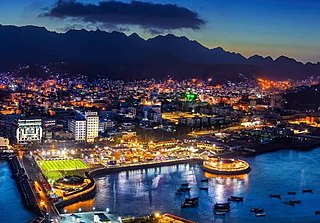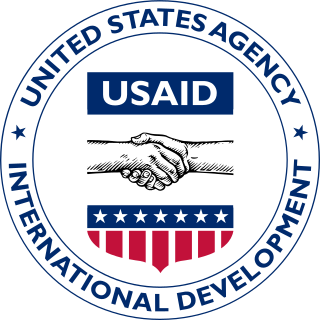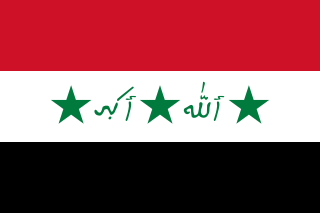
The economy of Iraq is dominated by the oil sector, which provided 89% of foreign exchange earnings in 2024. During its modern history, the oil sector has provided about 99.7% of foreign exchange earnings. Iraq's hitherto agrarian economy underwent rapid development following the 14 July Revolution in 1958 which overthrew the Hashemite Iraqi monarchy. It had become the third-largest economy in the Middle East by 1980. This occurred in part because of the government's successful industrialization and infrastructure development initiatives led by Saddam Hussein in the 1970s, which included irrigation projects, railway and highway construction, and rural electrification.

The Marshall Plan was an American initiative enacted in 1948 to provide foreign aid to Western Europe. The United States transferred $13.3 billion in economic recovery programs to Western European economies after the end of World War II. Replacing an earlier proposal for a Morgenthau Plan, it operated for four years beginning on April 3, 1948, though in 1951, the Marshall Plan was largely replaced by the Mutual Security Act. The goals of the United States were to rebuild war-torn regions, remove trade barriers, modernize industry, improve European prosperity and prevent the spread of communism. The Marshall Plan proposed the reduction of interstate barriers and the economic integration of the European Continent while also encouraging an increase in productivity as well as the adoption of modern business procedures.

The economy of Senegal is driven by mining, construction, tourism, fishing and agriculture, which are the main sources of employment in rural areas, despite abundant natural resources in iron, zircon, gas, gold, phosphates, and numerous oil discoveries recently. Senegal's economy gains most of its foreign exchange from fish, phosphates, groundnuts, tourism, and services. As one of the dominant parts of the economy, the agricultural sector of Senegal is highly vulnerable to environmental conditions, such as variations in rainfall and climate change, and changes in world commodity prices.

The economy of Yemen is weak and underdeveloped, all the more so since the breakout of the Yemeni Civil War which has led to instability and a growing humanitarian crisis. At the time of unification, South Yemen and North Yemen had different but equally struggling underdeveloped economic systems. Since unification, the economy has been further harmed by the consequences of Yemen's support for Iraq during the 1990–91 Persian Gulf War: Saudi Arabia expelled almost 1 million Yemeni workers, and both Saudi Arabia and Kuwait significantly reduced economic aid to Yemen. The 1994 civil war further drained Yemen's economy. As a consequence, Yemen has relied heavily on aid from multilateral agencies to sustain its economy for the past 24 years. In return, it has pledged to implement significant economic reforms. In 1997 the International Monetary Fund (IMF) approved two programs to increase Yemen's credit significantly: the enhanced structural adjustment facility and the extended funding facility (EFF). In the ensuing years, Yemen's government attempted to implement recommended reforms: reducing the civil service payroll, eliminating diesel and other subsidies, lowering defense spending, introducing a general sales tax, and privatizing state-run industries. However, limited progress led the IMF to suspend funding between 1999 and 2001.

The United States Agency for International Development (USAID) is an independent agency of the United States government that is primarily responsible for administering civilian foreign aid and development assistance. With a budget of over $50 billion, USAID is one of the largest official aid agencies in the world and accounts for more than half of all U.S. foreign assistance—the highest in the world in absolute dollar terms.

The Coalition Provisional Authority was a transitional government of Iraq established following the invasion of the country on 19 March 2003 by U.S.-led Coalition forces. The invasion marked the fall of the Ba'athist regime led by Saddam Hussein.

The Overseas Private Investment Corporation (OPIC) was the United States Government's Development finance institution until it merged with the Development Credit Authority (DCA) of the United States Agency for International Development (USAID) to form the U.S. International Development Finance Corporation (DFC). OPIC mobilized private capital to help solve critical development challenges and in doing so, advanced the foreign policy of the United States and national security objectives.

A Provincial Reconstruction Team (PRT) was a unit introduced by the United States government, consisting of military officers, diplomats, and reconstruction subject matter experts, working to support reconstruction efforts in unstable states. PRTs were first established in Afghanistan in early 2002, and were used in Iraq as well. While the concepts are similar, PRTs in Afghanistan and Iraq had separate compositions and missions. Their common purpose, however, was to empower local governments to govern their constituents more effectively.

Investment in post-2003 Iraq refers to international efforts to rebuild the infrastructure of Iraq since the Iraq War in 2003. Along with the economic reform of Iraq, international projects have been implemented to repair and upgrade Iraqi water and sewage treatment plants, electricity production, hospitals, schools, housing, and transportation systems. Much of the work has been funded by the Iraq Relief and Reconstruction Fund, and the Coalition Provisional Authority.
The debt of developing countries usually refers to the external debt incurred by governments of developing countries.
In May 2003, following the invasion of Iraq in March of that year, the Central Bank of Iraq-Development Fund for Iraq (DFI) account was created at the U.S. Federal Reserve Bank of New York at the request of the Coalition Provisional Authority (CPA) Administrator. A part of the fund has been transferred to Baghdad and Iraq, and the DFI-Baghdad account was opened at the Central Bank of Iraq "for cash payment requirements". The fund also eventually received money from seized and "vested" Iraqi bank accounts and funds seized by coalition forces. $650 million of this amount belongs to Uday Saddam Hussein, the older son of the former Iraqi president. The DFI have been disbursed mainly for "the wheat purchase program, the currency exchange program, the electricity and oil infrastructure programs, equipment for Iraqis security forces, and for Iraqi civil service salaries and ministry budget operations".

In international relations, aid is – from the perspective of governments – a voluntary transfer of resources from one country to another. The type of aid given may be classified according to various factors, including its intended purpose, the terms or conditions under which it is given, its source, and its level of urgency. For example, aid may be classified based on urgency into emergency aid and development aid.

Australian Aid is the brand name used to identify projects in developing countries supported by the Australian Government. As of 2014 the Department of Foreign Affairs and Trade (DFAT) has been responsible for Australia's official development assistance to developing countries.

After World War II, Ethiopia began to receive economic development aid from the more affluent Western countries. Originally the United Kingdom was the primary source of this aid, but they withdrew in 1952, to be replaced by the United States. Between 1950 and 1970, one source estimated that Ethiopia received almost US$600 million in aid, $211.9 million from the US, $100 million from the Soviet Union and $121 million from the World Bank. Sweden trained the Imperial Bodyguard and India at one point contributed the majority of foreign-born schoolteachers in the Ethiopian educational system.
Haiti—an island country 600 mi (970 km) off the coast of the U.S. state of Florida—shares the Caribbean island of Hispaniola with the Dominican Republic. Haiti has received billions in foreign assistance, yet persists as one of the poorest countries and has the lowest human development index in the Americas. There have been more than 15 natural disasters since 2001 including tropical storms, flooding, earthquakes and hurricanes. The international donor community classifies Haiti as a fragile state. Haiti is also considered a post-conflict state—one emerging from a recent coup d'état and civil war.
Nepal relies heavily on foreign aid, and donors coordinate development aid policy through the Nepal Development Forum, whose members include donor countries, international financial institutions, and inter-governmental organizations. Japan is Nepal's largest bilateral aid donor, and the World Bank and Asian Development Bank are the largest multilateral donors. Donors have been reported as losing confidence in Nepal as a result of political interference and corruption in poverty relief efforts as well as the country's apparently poor capacity to utilize aid. According to World Bank figures, official development assistance increased from US$8.2 million in 1960 to US$369 million in 2003 and then fell to US$177 million in 2004. According to Nepal's Ministry of Finance, total foreign aid committed in fiscal year (FY) 2003 was US$555 million, with 63.3 percent in grants and 36.7 percent in loans. In FY2004, total foreign aid committed was US$320 million, of which 37.7 percent was grants and 62.3 percent, loans. In June 2004, active World Bank credits totaled US$302 million, with the greatest portions allocated to the financial sector and to energy and mining. By the end of 2012, the outstanding World Bank IDA loan totaled $ 1.48 billionArchived 2015-05-05 at the Wayback Machine.
Reconstruction in Afghanistan refers to the efforts to improve Afghanistan's governance as well as physical buildings and infrastructure following the overthrow of the First Islamic Emirate of Afghanistan by the United States. These efforts involved various groups including supranational organizations, the Afghan government, the US government and other foreign governments, and civilians. These efforts also include training civil administrators, improving essential services and public safety, supporting civil society and self-determination, and promoting the rule of law and economic development.
Economic reform in Iraq describes decisions by the Coalition Provisional Authority to dramatically change the economy of Iraq in the aftermath of the 2003 U.S.-led invasion.

Climate finance is an umbrella term for financial resources such as loans, grants, or domestic budget allocations for climate change mitigation, adaptation or resiliency. Finance can come from private and public sources. It can be channeled by various intermediaries such as multilateral development banks or other development agencies. Those agencies are particularly important for the transfer of public resources from developed to developing countries in light of UN Climate Convention obligations that developed countries have.
The World Bank Group country partnership framework aims to support Haiti's efforts to reduce poverty and provide economic opportunities for all Haitians. The framework aims to strengthen institutions, government capacity, and public financial management as aid and concessional financing rapidly decline.













